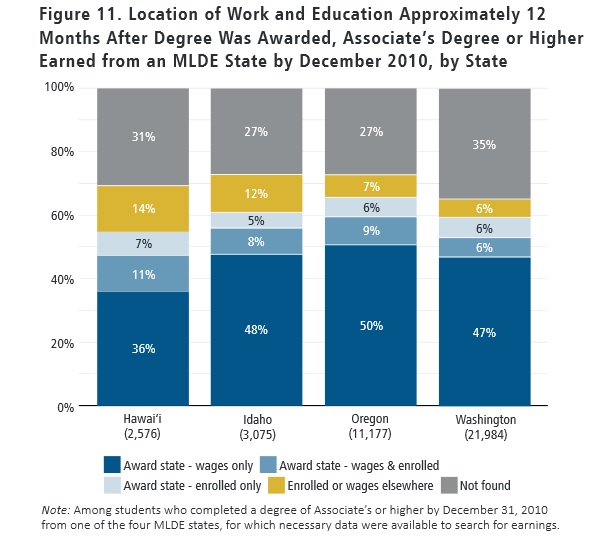The Benefits of Multi-State Sharing
by Doug Lederman, Inside Higher Ed, August 15, 2014
The inadequacies of existing data about higher education outcomes has been much discussed in recent months, with "flawed data" at the core of arguments against President Obama's proposed college rating system and talk of legislation in Congress to collect more and better information about enrollments, completion rates, and other factors.
Reports released Thursday by the Western Interstate Commission for Higher Education make the case that producing better data may not be easy, but is possible.
The reports outline the results of WICHE's Multistate Longitudinal Data Exchange, in which four members of the Western collaborative -- Hawaii, Idaho, Oregon and Washington -- agreed to share educational and workforce data as a pilot project to see whether they could improve their understanding of the paths their citizens follow after leaving high school.
The answer, simplistically, was yes.
The process of getting there was anything but simple, though, requiring the merging and aligning of datasets on 2005 high school graduates from the four states as well as all first-time postsecondary students who started college in 2005-6, and then ultimately comparing those data to education and workforce databases in the four states. The first of the reports describes how the work was done and the lessons learned for policy makers who might hope to replicate or expand such work. It's a wonk's dream.
The other report focuses on what the states actually learned from the data. Most importantly, perhaps, the sharing arrangement provided information on enrollment and employment outcomes for more high school graduates than the states had from their own records alone -- 6 percent more for Washington, 14 percent more for Hawaii.
The chart below, for instance, shows what happened to the 2005 high school graduates from the four states who enrolled in college within the next year and received at least an associate degree by 2010 -- and what had happened to them. Half of the Oregon natives were working in that state, 9 percent were working and still enrolled in college in Oregon, 6 percent were just enrolled in college in Oregon, and 7 percent were either enrolled or working in one of the other three states in the project. The remainder, 27 percent, were "not found."

WICHE officials said that they were able to ensure the privacy of student data in the pilot project (a common critique of proposals for more expansive student-level data systems is that they will put privacy at risk), and that they are working to include other states in the endeavor.
The project was funded by -- yes, you guessed it -- the Bill & Melinda Gates Foundation.
---30---